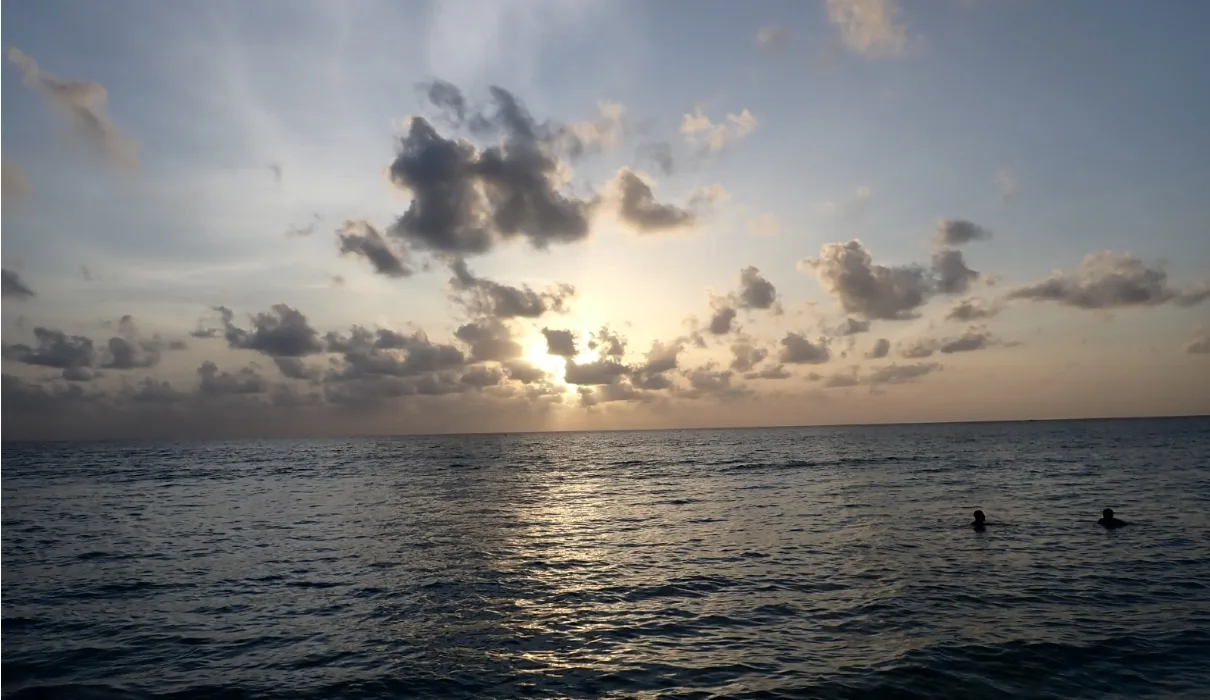Programs Blog
Final Thoughts on Coral and Conservation

November 19th, 2024
Location: Paradise Point, Barbados
Weather: 84˚ F and cloudy
Wow, so blog, this is it, my final entry. To commemorate my entry, I am going to talk about a topic that has become dear to my heart: coral. Coral is no rock or plant, but a living organism made up of individual polyps. Corals come in different shapes, colors, and sizes, with some containing only one microscopic polyp and others being 100 feet long, with hundreds of thousands of polyps. Coral polyps share a symbiotic relationship with dinoflagellate algae, a species living in their tissue. Dinoflagellates are essential for the survival of corals, providing nearly 90% of the nutritional requirement.
Corals use their energy from feeding and photosynthesis to secrete calcium carbonate as a method of growth. Over time, shallow reef coral species, through the accumulation of calcium carbonate, build a three-dimensional environment. The three-dimensional structures built by corals are filled with pockets, tunnels, and overhangs, providing a safe haven for fish and invertebrate species. Coral reefs span the entire globe but inhabit less than 0.1% of the ocean floor yet supply nearly 25% of the ocean’s biodiversity. Species found within a shallow coral reef vary greatly, from massive sharks to tiny worms, but each species fills a vital ecological niche within the greater coral reef ecosystem.
Unfortunately, coral reefs are dying. Coral degradation on reefs due to anthropogenic causes such as sea level rise, worsening storms, and increased erosion are well documented. Nearly 19% of the world’s corals have died from coral bleaching, and another 35% are critically endangered. According to the GCRMN (Global Coral Reef Monitoring Network) today, on Caribbean coral reefs, there is only 10.2% coral cover, the lowest in human history, which sadly brings me to my next point: conservation.
It is quite disparaging that we now must rely on conservation to revitalize a once beautiful, vibrant, and diverse ecosystem relied upon by millions. Coral reefs are more than just a place for tourists and scientists to swim, snorkel, and scuba dive. They are a place of great cultural importance, religious identity, economic stability, and food source for people around the globe, but especially in developing nations.
With that being said, coral reef conservation does play a crucial role in revitalizing coral reef health, but it must fight more than an uphill battle, a climb up Mount Everest. Coral reef conservation must walk the fine line of allowing people to access resources they need while preserving coral reefs during times of unprecedented anthropogenic effects. We have personally seen and heard from marine protected area managers, and conservationists about the struggle to convince the public to conserve coral reefs, and it makes sense; why should a fisherperson from St. Croix have to stop fishing a reef because of carbon pollution from a faraway country?
The number one challenge coral reef conservation has is education. Until people understand the importance of coral reefs and the unfathomable challenges that they face, little progress will be made. The good news is we can educate people, and islands surrounded by coral reefs are already doing the work. On every island we have visited, we have talked to organizations and local partners of Sea Education Association who are actively going into schools teaching children about coral reefs, teaching local islanders how to swim and snorkel, and talking with local fisherpeople to discuss the placement of Marine Protected Areas. Change is happening, albeit too slowly; so, if you care about coral reefs, there is so much for you to do. Below are just some of many examples of ways to join in the fight to protect coral reefs:
- Educate yourself, your family, and your friends on the drivers behind climate change, ocean warming, and coral reef degradation.
- Reduce your own greenhouse gas emissions and call upon companies, businesses, and governments to do the same.
- Donate to amazing conservation efforts around the world.
- Vote for people who will take action in the fight against climate change.
While I know this topic is scary, saddening, and anxiety-producing, the fight to keep coral reefs is a chance to prove that education and community are stronger than corporate greed and polarization. We all play a vital role in providing the next generation with a chance to live in a world where corals do not bleach every nine months and there is no need for coral restoration projects. Let’s make that happen.
Lastly, thank you to my six classmates, each of whom are amazing people who have joined in this fight to make the world a better place. Our 25-year reunion will be packed with stories of Cayla saving whales, Leandro’s groundbreaking non-profit ideas, Sara’s new freediving world record, Keegan’s professional underwater photos, and Katie’s discovery of a new marine species. I am so excited to see the amazing things each of you achieve throughout your fruitful careers and wish you all the very best.
Sincerely, one of your CRCC 2024 class representatives,
Jeremy. 
Recent Posts from the Ships
- Ocean Classroom 2024-A collaborative high school program with Proctor Academy
- Collaborations and Long-term Commitments: SEA’s Caribbean Reef Program Sets a Course for Coastal Programs that Compliment Shipboard Experiences.
- Sea Education Association students prepare for life underway using state of the art nautical simulation from Wartsila Corporation.
- SEA Writer 2022, Magazines From the Summer SEA Quest Students
- Technology@SEA: Upgrades Allow Insight into Ocean Depths
Programs
- Gap Year
- Ocean Exploration
- High School
- Science at SEA
- SEA Expedition
- SEAScape
- Pre-College
- Proctor Ocean Classroom
- Protecting the Phoenix Islands
- SPICE
- Stanford@SEA
- Undergraduate
- Climate and Society
- Climate Change and Coastal Resilience
- Coral Reef Conservation
- Marine Biodiversity and Conservation
- MBL
- Ocean Exploration: Plastics
- Ocean Policy: Marine Protected Areas
- Oceans and Climate
- Pacific Reef Expedition
- The Global Ocean: Hawai'i
- The Global Ocean: New Zealand